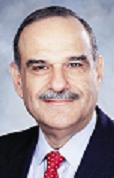Osama and Katrina ...
Thomas Friedman (2005) describes “a gut reaction that George Bush and Dick Cheney were the right guys to deal with Osama. I was not alone in that feeling, and as a result, Mr. Bush got a mandate, almost a blank check, to rule from 9/11 that he never really earned at the polls.
“Well, if 9/11 is one bookend of the Bush administration, Katrina may be the other. If 9/11 put the wind at President Bush's back, Katrina's put the wind in his face. If the Bush-Cheney team seemed to be the right guys to deal with Osama, they seem exactly the wrong guys to deal with Katrina - and all the rot and misplaced priorities it's exposed here at home.”
Friedman finds it “unavoidably obvious that we need a real policy of energy conservation,” adding that “President Bush can barely choke out the word ‘conservation.’”
On tax policy, Friedman suggests that “The Bush team has engaged in a tax giveaway since 9/11 that has had one underlying assumption: There will never be another rainy day. Just spend money. You knew that sooner or later there would be a rainy day, but Karl Rove has assumed it wouldn't happen on Mr. Bush's watch - that someone else would have to clean it up. Well, it did happen on his watch.”
Friedman suggests other opportunities that the Bush team missed:
its refusal to impose a gasoline tax after 9/11, which would have begun to shift our economy much sooner to more fuel-efficient cars, helped raise money for a rainy day and eased our dependence on the world's worst regimes for energy;
its refusal to develop some form of national health care to cover the 40 million uninsured; and,
its insistence on cutting more taxes, even when that has contributed to incomplete levees and too small an Army to deal with Katrina, Osama and Saddam at the same time.
“Besides ripping away the roofs of New Orleans, Katrina ripped away the argument that we can cut taxes, properly educate our kids, compete with India and China, succeed in Iraq, keep improving the U.S. infrastructure, and take care of a catastrophic emergency - without putting ourselves totally into the debt of Beijing.”
Friedman, Thomas L. “Osama and Katrina” New York Times OpEd September 7, 2005
“Well, if 9/11 is one bookend of the Bush administration, Katrina may be the other. If 9/11 put the wind at President Bush's back, Katrina's put the wind in his face. If the Bush-Cheney team seemed to be the right guys to deal with Osama, they seem exactly the wrong guys to deal with Katrina - and all the rot and misplaced priorities it's exposed here at home.”
Friedman finds it “unavoidably obvious that we need a real policy of energy conservation,” adding that “President Bush can barely choke out the word ‘conservation.’”
On tax policy, Friedman suggests that “The Bush team has engaged in a tax giveaway since 9/11 that has had one underlying assumption: There will never be another rainy day. Just spend money. You knew that sooner or later there would be a rainy day, but Karl Rove has assumed it wouldn't happen on Mr. Bush's watch - that someone else would have to clean it up. Well, it did happen on his watch.”
Friedman suggests other opportunities that the Bush team missed:
its refusal to impose a gasoline tax after 9/11, which would have begun to shift our economy much sooner to more fuel-efficient cars, helped raise money for a rainy day and eased our dependence on the world's worst regimes for energy;
its refusal to develop some form of national health care to cover the 40 million uninsured; and,
its insistence on cutting more taxes, even when that has contributed to incomplete levees and too small an Army to deal with Katrina, Osama and Saddam at the same time.
“Besides ripping away the roofs of New Orleans, Katrina ripped away the argument that we can cut taxes, properly educate our kids, compete with India and China, succeed in Iraq, keep improving the U.S. infrastructure, and take care of a catastrophic emergency - without putting ourselves totally into the debt of Beijing.”
Friedman, Thomas L. “Osama and Katrina” New York Times OpEd September 7, 2005





0 Comments:
Post a Comment
<< Home